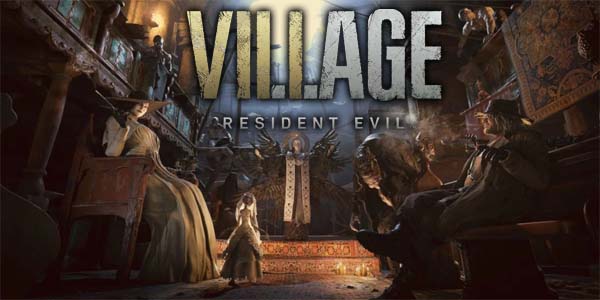
Village seems to be positioning itself as a sort of "greatest hits" of earlier Resident Evil games. I'm not sure it all comes together as well as Capcom must have hoped it would. Resident Evil VII Biohazard did an excellent job of modernizing the design philosophies of the original Resident Evil game. Map design, inventory and resource constraints, and the "fight or flight" nature of enemy encounters all perfectly re-captured the feel of the original PS1 classics, without all of the clunkiness.
Village maintains the exploratory map design of the original Resident Evil and of Resident Evil VII, but it also tries to port concepts and aesthetics from the Resident Evil 2 remake and from Resident Evil 4. The RE2 stuff fits well enough, but the RE4 influences just don't feel compatible with classic design philosophy.
The setting instantly reminded me of Resident Evil 4.
Clash of philosophies
Right off the bat, the general aesthetic screams "Resident Evil 4". The game begins in a small, rustic, eastern European village at the foot of a gothic castle. Just like in RE4, you're quickly ambushed by the monstrous villagers and have to desperately fight your way out. Resident Evil 4 replaced the traditional zombies of the series with semi-aware "ganados"; Village similarly breaks away from the traditional zombies, but this time, the monsters are werewolves.
Not long into the game, you'll start smashing crates to reveal hidden loot, and pixel-hunting along the walls and ceilings for obnoxious sparkling gems to shoot down and collect. Also just like in Resident Evil 4, you'll routinely get rewards of items and money from defeated enemies. That money and loot is used to buy items or upgrade your equipment at a shop, just like in Resident Evil 4. This is where the game started to break down for me.
Loot, ammo, and cash can be recovered from smashed crates or defeated enemies.
Giving the player rewards of in-game cash for defeating foes (and for wasting bullets to shoot glowing gems off of walls) completely changes the motivations of the player in how we deal with enemies. I'm no longer carefully considering whether to try to sneak past an enemy or run away, nor am I ever firing off a single round at an enemy's knee to stun or cripple it so I can get away without consuming more resources, the way I might in REmake2. Since every defeated foe returns some of the resources that I invest into killing it, there is no "fight or flight"; only "fight". The enemies stop being threatening or frightening, especially on the standard difficulty setting, in which ammunition is readily available and the monsters patiently await their turns to charge and attack.
Even inventory management is mostly thoughtless. The more linear, more action-oriented, and less puzzle-oriented design of the game means that key items and treasures are not put in your limited inventory, and there isn't even a storage box to keep excess weapons or supplies. Only weapons, ammo, and healing items go into your briefcase. Everything else has unlimited storage. Even crafting components have separate, unlimited storage (the only exception being the animals meats needed for the Duke to cook meals -- more on this later). [More]
b05b0e00-39c0-4ac3-9d47-9089537c0f54|1|5.0
Tags:Resident Evil, Resident Evil VIII Village, Capcom, horror, survival horror, action, shooter, Resident Evil 4, gothic horror, vampire, werewolf, Ethan Winters, Lady Dimitrescu, castle
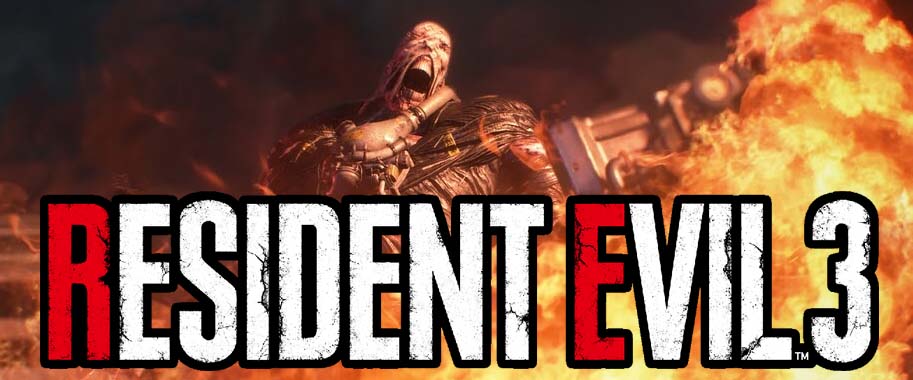
I played the demo of Nemesis that came packaged
with Dino Crisis, but never played the full game.
Right off the bat, I have to say that Resident Evil 3: Nemesis was never my favorite Resident Evil game. In fact, I never even played the whole thing. I played the demo that was included with Dino Crisis (back in the day when game publishers released playable demos before a game even came out). The original Nemesis erred more on the side of fast-paced action, which just doesn't appeal to me as much as the slower, more thoughtful design philosophy of the original Resident Evil, along with Silent Hill and Dino Crisis. This is why I love the original RE and its GameCube remake, why Resident Evil 4 rubbed me the wrong way, and why I never really got into the rest of the Resident Evil franchise beyond the first game. I tried playing all of the Resident Evil games up through 5, but the only one that came close to holding a candle to the masterful original was 2.
So even though I was excited to play Capcom's remake of the PS1 classic, I went in with tempered expectations. If they stayed true to the original, then RE3make (or whatever we're calling it) would be far more high-octane and action-heavy than the Resident Evil 2 remake that was released a mere year ago. As such, I expected that I just wouldn't be quite as into RE3make as I was into Resident Evil 7 or RE2make. I could only hope that it hit some happy medium between RE2make and Resident Evil 4. But that's really just personal preference on my part. Your tastes may vary.
So now that you hopefully understand where I'm coming from, what do I actually think of Resident Evil 3: Nemesis in 2020? Did Capcom learn any lessons from the few mistakes that were made with RE2make?
Resident Evil 3 is more reliant on spectacle action set pieces than on slowly building atmospheric tension.
The different nature of "Hardcore" mode
If you remember my review of Resident Evil 2 remake (and my lengthy YouTube critique), then you know that one of my core issues with that game was the fact that Capcom locked the Ink Ribbon save system behind that game's hard difficulty. Resident Evil 7 actually had the same problem, but it didn't bother me in that game because RE7 wasn't a remake of a game that included Ink Ribbon saves as a core component of its design.
I felt the Hardcore mode and breakable knife were huge design flaws in RE2make.
In summary, the hard mode made death come much swifter in RE2make. Resource-management wasn't as important as skillful aiming and shooting. Instead of taking a bite or two here and there and having to decide when to fill your scant inventory with a healing item just in case (in the original Resident Evil games), RE2make's hardcore mode made you have to heal pretty much every time you took damage because you couldn't survive a second hit. This low tolerance for mistakes and strict punishment for death felt considerably less fair for someone in a first-time playthrough.
The fact that your knife could break and you could literally be stuck with a save file in which you have zero damage-dealing potential certainly didn't help the feeling of fairness in my book.
My recommendation was for Capcom to separate the hard difficulty setting and the hardcore save system into two options. You should be able to chose whether you want to use Ink Ribbons, and then you should also be able to chose whether you want to play the game on easy, normal, or hard difficulties.
Typewriters are still here, but Ink Ribbons are completely absent.
Instead, Capcom opted to just remove Ink Ribbons for its Nemesis remake. Entirely. They are not locked behind hardcore mode. They are not locked behind New Game Plus. Typewriters are still here, but Ink Ribbons are not in the game at all.
... [More]
106af6d6-125a-4641-8a21-bad7e6976528|1|5.0
Tags:Resident Evil, Resident Evil 3: Nemesis, Capcom, Jill Valentine, Carlos Oliveira, nemesis, horror, survival horror, action, ink ribbon, zombie, knife, loot box, micro-transaction, pay-to-win
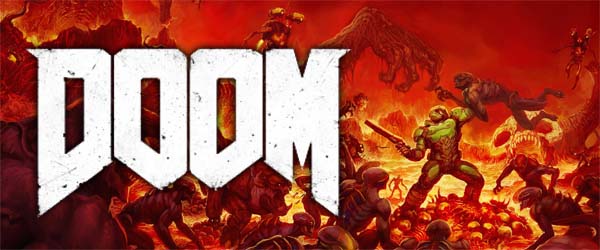
I never played the original Doom. I didn't get into PC gaming until the mid twenty-aughts, and even then didn't play much in the way of first person shooters that weren't the first two Call of Duty games. I was always more into SimCity and Civilization. So I was in no rush to play 2016's reboot of Doom, nor can I really look at it from the perspective of how it holds up against the original's legacy. I heard a lot of good things about it, and picked it up on this year's Steam summer sale.
Bethesda recently announced a sequel, so I thought I'd check this one out to find out if I should be excited.
I miss the good ol' days of game demos being available before a game releases.
I actually did play the free demo on the PSN months ago, which was an option for me because the game's been out for two years already (does this count as a retro review?). I miss the days when free demos were available before a game's release, so we could try it before we buy it. Sigh. Anyway, I had a lot of trouble with hitting enemies with a PS4 controller considering how fast and movement-oriented the combat is, but I definitely saw the potential enjoyment that I could have with the finer control of a mouse. So I went ahead with the Steam purchase.
Punch a demon in the face
Doom breaks from the cover-based mold set by most recent big budget first-person shooters by encouraging very fast, very frenetic, very aggressive, and very in-your-face action in a fashion similar to Bloodborne. Staggering an enemy allows you to perform a melee "Glory Kill" that provides you with a shower of health pick-ups and ammo. When your health is critical, the best course of action usually isn't to run away and take cover (like in so many modern cover-based shooters); rather, the ideal strategy is often to find the biggest, meanest demon, shotgun it in the face, and then rip its head off with your own bare hands. This keeps the player in the action, and mostly removes the need to backtrack through a level to find health kits and powerups. It's not quite as tactical or thoughtful as the dismemberment system from Dead Space, and some might argue that it's derivative of the chainsaw from Gears of War, but it does help to create a definite flow to the combat that helps it to stand out from other shooters of the era.
Charging an enemy is often the best way to restore your health.
The default move speed is faster than the sprint of most other modern shooter games. You can press 'Shift' to toggle a "walk" mode, but I honestly don't know why you would ever want to, and I never once used it after experimenting with the controls at the start of the game. Most enemies also charge at you with melee attacks or have actual projectile attacks (as opposed to hit-scan weapons). You don't avoid damage by ducking behind cover; instead, you can usually just side-step an incoming projectile or attack. Again, because of the fast speed of the character, the term "side-step" isn't really apt; it's more like a "side-sprint".
This all creates a very retro feel that [I assume] faithfully captures the spirit and fluidity of the original game's combat. It's an experience more akin to a first-person bullet hell game rather than the cover-based, whack-a-mole shooting galleries that define most modern shooters. [More]
2028a05f-7ac8-4aa6-83e8-785b11e76705|0|.0
Tags:Doom, Id Software, shooter, first person shooter, Hell, demons, occult, Mars, science fiction, horror, action
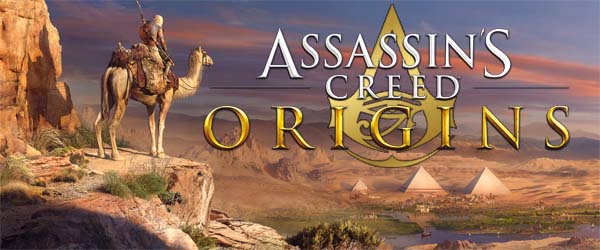
Hey, I actually managed to play and review all of this past holiday season's big, Triple-A releases! Hooray for me! I mean, sure it's the end of February, and I'm just now reviewing a game that came out last October, but at least I did play it.
Since the refreshing exceptionalism of Black Flag, the Assassin's Creed franchise has been scarred by mediocrity and controversy. As such, I opted to buy the game used off of eBay so as not to support Ubisoft. This is after I had enjoyed Black Flag so much that I happily bought a retail gift copy for a friend and recommended the game to yet another friend. Heck, if the save file could have been transferred over, I would have gladly traded in my PS3 copy of Black Flag for a PS4 retail copy.
Even Ubisoft realized that the series was growing stale, and stopped their cycle of releasing two or three games per year. It's been two full years since the last full release (Assassin's Creed: Syndicate in 2015). The extra time certainly helped elevate Assassin's Creed: Origins above the chaff of the rest of the franchise, but not quite enough to propel it to true greatness.
I played Origins on PS4, which means that I avoided the frustrations that many gamers reported involving Origins' multiple layers of DRM slowing down their computers. Wait, isn't Ubisoft the company that, years ago, publicly stated that DRM doesn't work, and that they "don't want to punish a paying player for what a pirate can easily work around"? This same company is now putting not one ... not two ... but three separate DRM applications on a single game? One of which is their own proprietary distribution service, U-Play? Is the company lying, or are they just scatterbrained and can't make up their mind? Or is the management just incompetent?
Would exploring tombs and temples by torchlight become a common mechanic?
Well, when I started up the actual game, I was pleasantly surprised that it starts off pretty damn strong. Even Black Flag was mired by an opening act that stranded players in a tedious, bog-standard Assassin's Creed
sandbox city for a couple hours before opening up the seas by giving us our own pirate ships. Origins, however, has a very strong, distinctive opening chapter that eventually gives way to a more bog-standard gameplay experience.
After an admittedly-silly and confusing opening cutscene that utterly fails to establish the setting or characters, Origins throws the player into a one-on-one duel to highlight the new combat mechanics, then hands main character Bayek a torch and asks the player to explore and escape from a derelict Egyptian temple. Then we head off across an intimidating swath of Saharan desert to the oasis that is Bayek's home town. Here, we have some open-ended exploration, hunting, rescue, and assassination missions. During this, we are introduced to the game's shining star: its setting and environment.
Classical Egypt is magnificently brought to life in this game. The map is vast and spread out, with large swaths of barren desert and sand dunes separating some of the game's regions. Small farming settlements and market hubs dot the environment, and each feels like a necessary part of a functional society. Best of all, Bayek isn't stopping every ten steps to pick up some random, meaningless collectible, and our map isn't cluttered with icons representing all this meaningless garbage.
Egypt feels vast, is beautiful, and is brimming with life and energy.
Not only does the map work well with its sense of physical scale, but it also excels at representing the temporal scale of Egypt. Even though we are playing in antiquity, the game world is still dotted with tombs and abandoned settlements, some of which are thousands of years old. Remember, ancient Egypt is one of the longest-lasting civilizations in the history of the world, having been a world superpower for over three thousand years! The time span between the building of the Great Pyramids in Giza, and the life of Cleopatra is longer than the time span between Cleopatra and our lives today. Assassin's Creed: Origins completely nails that sense of living in this ancient kingdom... [More]
127c637d-fe49-4052-bc0a-c76d2f790de8|0|.0
Tags:Assassin's Creed, Assassin's Creed: Origins, Ubisoft, history, RPG, action, combat, stealth, parkour, Egypt, Rome, Bayek, Cleopatra, McGuffin, Dark Souls, micro-transaction, eBay
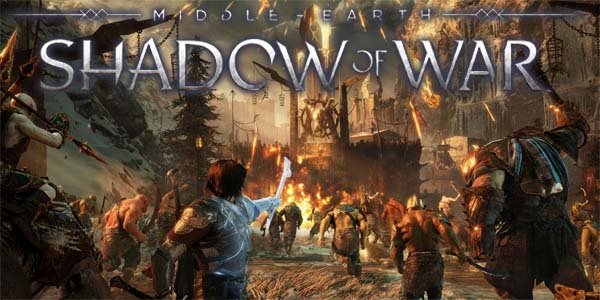
Dang. I was really hoping to have this out before the end of the year...
Shadow of Mordor was easily one of my favorite games of 2015, and one of my best reviewed games of that year, and I even cited it as an example of successful open world game mechanics. I've praised the game for its tightly-focused design, relatively limited scale, and the fact that it didn't waste the player's time with an excess of meaningless collectible hunts.
"The developers showed plenty of restraint in many areas of design so that they could focus on the innovative new feature that everything in the game revolves around. The design is tight and streamlined. They didn't waste the player's time with an excessively large, complicated map, or a multitude of irrelevant mini-games and side quests."
- from my Middle-Earth: Shadow of Mordor review
Yes, the original game did have some collectible hunts. It did have some filler content. It did have bullshit, game-y missions with arbitrary win/loss conditions. But those issues weren't pervasive enough to bring down the game as a whole, and the game generally flowed very smoothly. In their quest to mindlessly monetize the sequel, Shadow of War, Warner Brothers and Monolith have doubled down on both the best elements and the worst elements of Shadow of Mordor, and the result is beautiful when it works, and ugly when it doesn't.
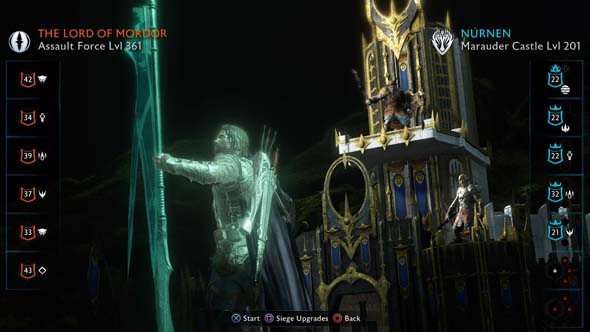
You now recruit orc captains to defend fortresses from Sauron's army.
The biggest problem is that the game now feels like a grind. In order to get you to pay for in-game, randomized micro-transactions called "War Chests", the campaign has been needlessly padded-out. Instead of having the option to hunt down uruk captains for the utilitarian purposes of gaining intel or gathering an army of mind-controlled slaves to do your bidding, you now must recruit orc captains into your own army in order to siege and then defend castles and fortresses from Sauron's counter-invasion. In principle, this sounds like a brilliant idea! I've often criticized open world and sandbox games for not having actual threats or consequences that pressure the player into acting. In fact, requiring that the player defend and hold captured strongholds from enemy counter-attacks is exactly the sort of thing that I've proposed as a compelling way to keep the game world feeling alive, and to keep the villain actually feeling threatening and antagonistic.
The problem is that (aside from one scripted castle defense) all the castle defending is back-loaded into the final act of the game. At this point, the plot is basically over, ... [More]
ae89c159-d700-491f-810c-2ed2093b5137|0|.0
Tags:Middle Earth: Shadow of War, Middle Earth: Shadow of Mordor, the Lord of the Rings, Monolith Productions, Warner Brothers Interactive Entertainment, J.R.R. Tolkien, Talion, Celebrimbor, orc, undead, wraith, elf, Middle Earth, Sauron, Shelob, Brûz The Chopper, action, open world, sandbox, parkour, RPG, micro-transaction, war chest, loot box, eBay
|

| 12 | | | | | | | 60 | | 11 | | | | | | | 55 | | 10 | | | | | | | 50 | | 09 | | | | | | | 45 | | 08 | | | | | | | 40 | | 07 | | | | | | | 35 | | 06 | | | | | | | 30 | | 05 | | | | | | | 25 | | 04 | | | | | | | 20 | | 03 | | | | | | | 15 | | 02 | | | | | | | 10 | | 01 | | | | | | | 05 |
|